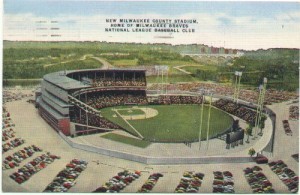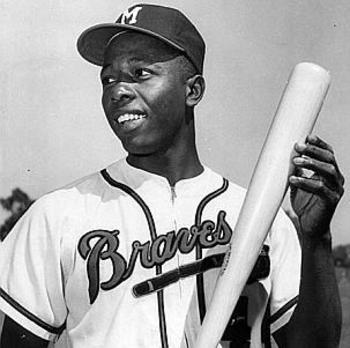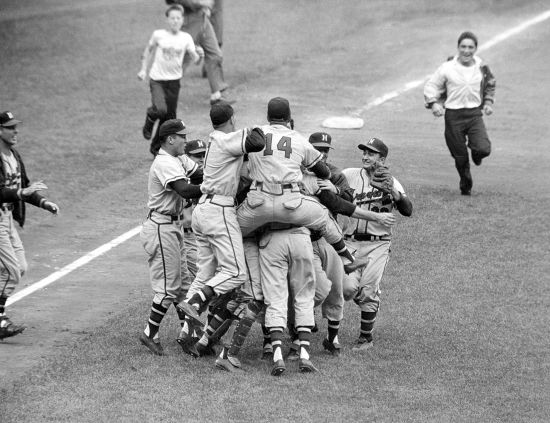The summer has proved to be oppressively hot, the news of the day generally negative, and my own baseball team is mired in mediocrity. It seems to be a perfect time to indulge in some nostalgia and sit down with a good book that speaks to an earlier, happier time. John Klima’s book Bushville Wins! fits the bill very nicely. A tome to the love affair between the city of Milwaukee and its Braves baseball team reminds us of the special link sports and sport teams have to the esteem, pride and general well being of their partner cities. Klima tells the story of a forward thinking owner, Boston Braves owner Lou Perini, who determined to change the face of baseball by directing his 1953 Braves team to leave its spring training home in Florida and return not to its ancestral home in major league Boston, where it had existed as one of the founding members of national professional baseball since the 1870’s, but instead go west and take its chances in a backwater minor league town of Milwaukee, Wisconsin. To the East Coast teams and the writers that covered their seasons for the public, this was a move to Podunk, USA, and guaranteed to fail, given the last of sophistication and understanding of baseball in the rubes of the west outside of St Louis and Chicago.
What Perini saw better than most though, was the enormous change that had come over the nation since the cataclysm of the second world war, and the potential for re-invigorating his sport of baseball, his team the Braves, and certainly his personal prosperity. His Braves were permanently mired as the second alternative to Boston fans to the exalted Boston Red Sox. From the beginning the Braves had suffered the loss of players, prestige, and loyalty of fans to their American League competitors, and despite having recently played in the 1948 World Series with a young and talented team, could barely draw 300,000 fans a year to their park, a financial loser of epic proportions. Perini sensed that the compressed east coast league geography that allowed the financial and on field dominance of the New York teams was ripe for change after World War II. Distances that seemed scheduler breakers were contracted by the new flexibility provided by air transport. Cities in the west had taken huge roles in providing the manpower and industrial muscle of the American war behemoth and were financially awash in a prosperous and hardworking populous. Most importantly, Branch Rickey’s rupture of the color line in baseball opened up a huge influx of spectacular talent to all teams willing to search the Negro Leagues and a new fan base available in towns that had supported Negro League teams. The gems to be mined might eventually be far west in the burgeoning cities of Los Angeles and San Francisco, but Perini wasn’t interested in waiting for their development.  The twelfth largest city in the USA had city leaders that wanted their city to be major league, and had taken the spectacular risk of build a major league ballpark to house their minor league team, just in case someone might take notice and move their team. In 1953, Milwaukee County Stadium was ready made and Perini had found his match in Milwaukee.
The twelfth largest city in the USA had city leaders that wanted their city to be major league, and had taken the spectacular risk of build a major league ballpark to house their minor league team, just in case someone might take notice and move their team. In 1953, Milwaukee County Stadium was ready made and Perini had found his match in Milwaukee.
And what a match it was. When the team got off the train from 1953 spring training to begin the season in Milwaukee, an estimated throng of 60,000 fans were there to greet them, and the love affair only grew from there. Perini, in spring of 1953 contract negotiations with his star pitcher Warren Spahn offered him his base contract of 30,000 or a contract of 10 cents for every patron that came through the turnstiles in Milwaukee. Spahn, who knew how the Braves had struggled to draw 300,000 fans the year before took the guaranteed money – to his spectacular detriment. At a time in baseball when drawing a million fans was considered a great season, the 1953 Braves drew 1.85 million, smashing all current attendance records, and would have made Spahn the richest player in baseball at over 180,000 dollars- it would be twenty years before a major league baseball player would be paid more. The city became the turnstile king of the 1950’s frequently topping two million fans a year and treated their baseball heroes like royalty that could do no wrong.
All that was left to make Perini’s fantasy complete was to win a World Series and to do it, he would need his Babe Ruth. The Milwaukee Braves of the 1950’s were an extremely talented team with future Hall of Famers slugger Eddie Matthews and ageless pitcher Warren Spahn anchoring the team, but the magic came with the signing of an unassuming young Negro League Indianapolis Clowns infielder with the bat quickness and sting of a Scorpion tail and wrists of iron, Henry Aaron.  Baseball produces great athletes but snagging the special ones, the Ruths, Williams, Mantles, and Bonds, are a once in a lifetime proposition and Hank Aaron was once in a lifetime special. Paired with slugger Eddie Matthews the pair would together hit 853 home runs for the Braves, one of the most prolific tandems in baseball history. The already dangerous Braves lineup was now the rival of the Dodger, giants, and Yankees and by 1957 it appeared the inevitable was to take place. The upstart westerners from Milwaukee, the podunks from the sticks, were going to have their shot at the mighty Yankees, and the baseball world would see if there was a new order in the universe.
Baseball produces great athletes but snagging the special ones, the Ruths, Williams, Mantles, and Bonds, are a once in a lifetime proposition and Hank Aaron was once in a lifetime special. Paired with slugger Eddie Matthews the pair would together hit 853 home runs for the Braves, one of the most prolific tandems in baseball history. The already dangerous Braves lineup was now the rival of the Dodger, giants, and Yankees and by 1957 it appeared the inevitable was to take place. The upstart westerners from Milwaukee, the podunks from the sticks, were going to have their shot at the mighty Yankees, and the baseball world would see if there was a new order in the universe.
Klima’s book is full of wonderful stories of a baseball world gone by, played by men who had second jobs in the off season and who played the game with a special desperation, managed by men who had played with Ruth, and edgy and confrontational at a time before baseball business was forever exposed to modern media and its political correctness. It also captures the world of a confident post war America anxious to prove itself the best in whatever the competition, and will to slather its love on any entity that would fulfill its image as major league in every way. Like all love stories, the end of the Braves’ romance with Milwaukee was a sad one with the team abandoning the fans for Atlanta in 1965, despite all that Milwaukee had done for the Braves. Klima’s story is however about requited pure love between a team and its city, and makes this summer’s stress take a backseat to a great story worth living one more time. In America, if you play hard and compete to be the best, Bushville can win – isn’t that the way it always should be?
